Organizational Behaviour: Motivation Theories and Team Dynamics
VerifiedAdded on 2023/06/10
|8
|2387
|397
Report
AI Summary
This report provides a comprehensive analysis of organizational culture, power, and politics within Tesco, examining their influence on individual and team behavior and performance. It evaluates content and process theories of motivation, such as Maslow's hierarchy of needs and Adam's equity theory, and motivational techniques used to achieve organizational goals. The report also differentiates between effective and ineffective teams, analyzes team development theories like Tuckman's stages, and applies key concepts and philosophies of organizational behavior, including individual differences, mutual interest, and the organization as a social system. The analysis concludes that a positive organizational culture, effective use of power, and strategic implementation of motivation theories are crucial for achieving desired organizational outcomes and enhancing overall performance at Tesco.

Written report
Paraphrase This Document
Need a fresh take? Get an instant paraphrase of this document with our AI Paraphraser
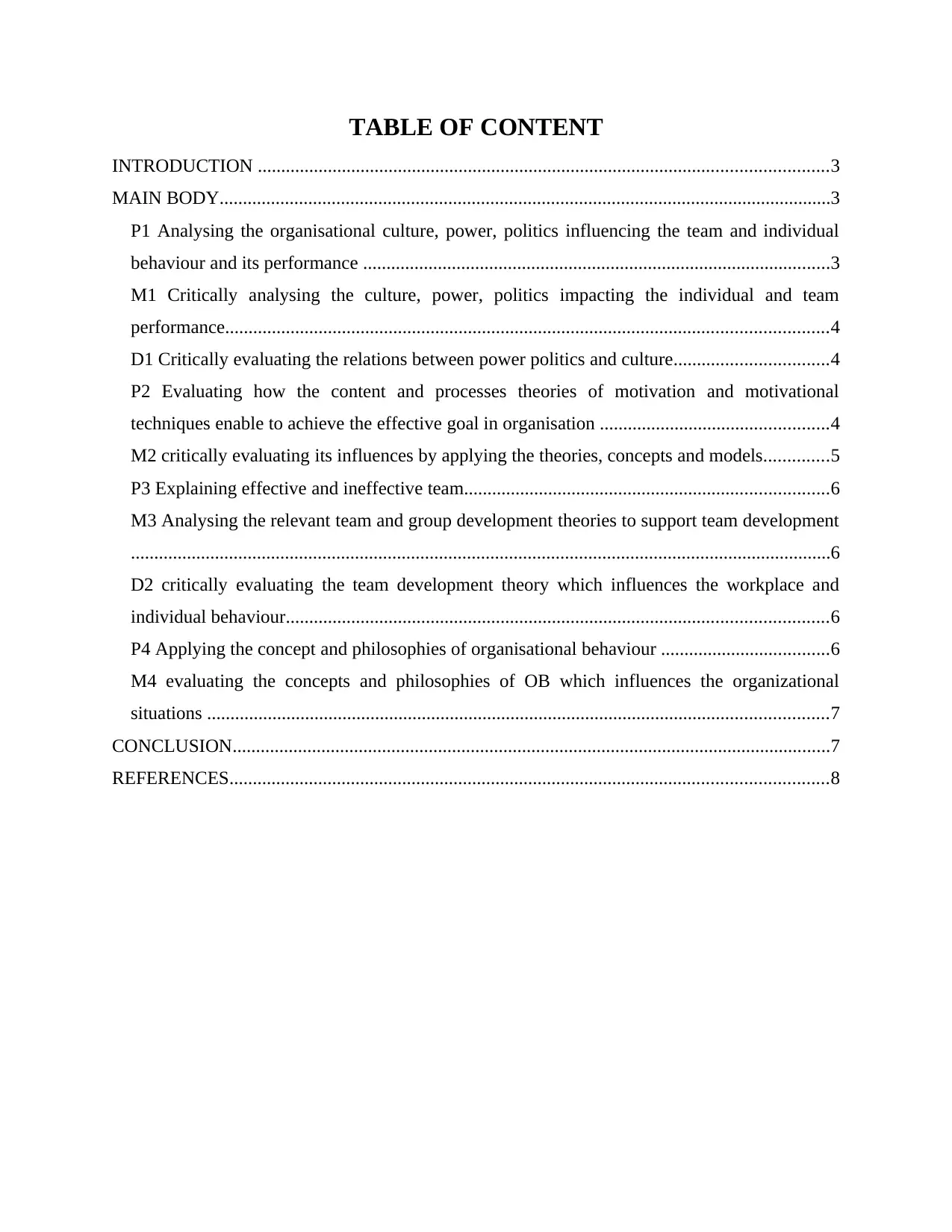
TABLE OF CONTENT
INTRODUCTION ..........................................................................................................................3
MAIN BODY...................................................................................................................................3
P1 Analysing the organisational culture, power, politics influencing the team and individual
behaviour and its performance ....................................................................................................3
M1 Critically analysing the culture, power, politics impacting the individual and team
performance.................................................................................................................................4
D1 Critically evaluating the relations between power politics and culture.................................4
P2 Evaluating how the content and processes theories of motivation and motivational
techniques enable to achieve the effective goal in organisation .................................................4
M2 critically evaluating its influences by applying the theories, concepts and models..............5
P3 Explaining effective and ineffective team..............................................................................6
M3 Analysing the relevant team and group development theories to support team development
......................................................................................................................................................6
D2 critically evaluating the team development theory which influences the workplace and
individual behaviour....................................................................................................................6
P4 Applying the concept and philosophies of organisational behaviour ....................................6
M4 evaluating the concepts and philosophies of OB which influences the organizational
situations .....................................................................................................................................7
CONCLUSION................................................................................................................................7
REFERENCES................................................................................................................................8
INTRODUCTION ..........................................................................................................................3
MAIN BODY...................................................................................................................................3
P1 Analysing the organisational culture, power, politics influencing the team and individual
behaviour and its performance ....................................................................................................3
M1 Critically analysing the culture, power, politics impacting the individual and team
performance.................................................................................................................................4
D1 Critically evaluating the relations between power politics and culture.................................4
P2 Evaluating how the content and processes theories of motivation and motivational
techniques enable to achieve the effective goal in organisation .................................................4
M2 critically evaluating its influences by applying the theories, concepts and models..............5
P3 Explaining effective and ineffective team..............................................................................6
M3 Analysing the relevant team and group development theories to support team development
......................................................................................................................................................6
D2 critically evaluating the team development theory which influences the workplace and
individual behaviour....................................................................................................................6
P4 Applying the concept and philosophies of organisational behaviour ....................................6
M4 evaluating the concepts and philosophies of OB which influences the organizational
situations .....................................................................................................................................7
CONCLUSION................................................................................................................................7
REFERENCES................................................................................................................................8
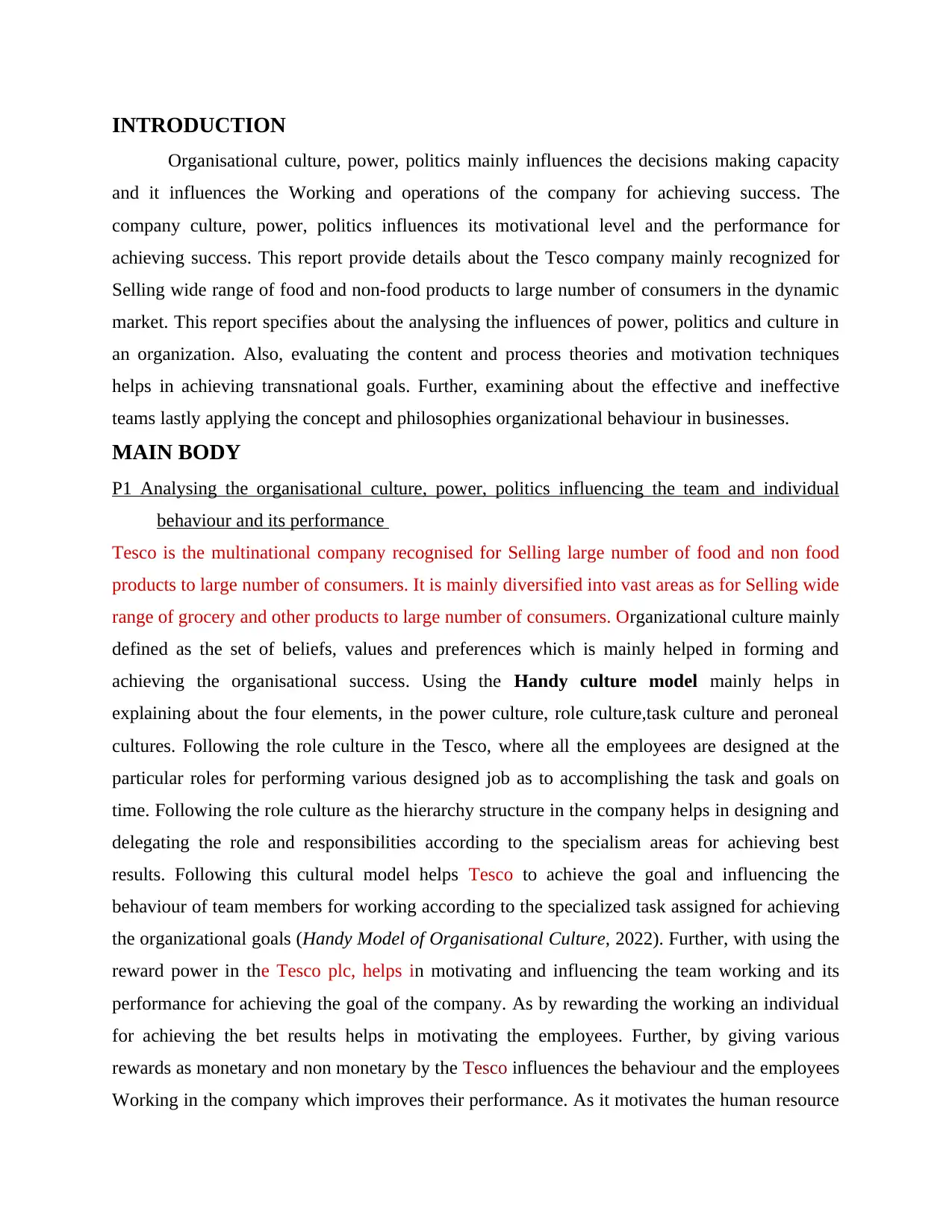
INTRODUCTION
Organisational culture, power, politics mainly influences the decisions making capacity
and it influences the Working and operations of the company for achieving success. The
company culture, power, politics influences its motivational level and the performance for
achieving success. This report provide details about the Tesco company mainly recognized for
Selling wide range of food and non-food products to large number of consumers in the dynamic
market. This report specifies about the analysing the influences of power, politics and culture in
an organization. Also, evaluating the content and process theories and motivation techniques
helps in achieving transnational goals. Further, examining about the effective and ineffective
teams lastly applying the concept and philosophies organizational behaviour in businesses.
MAIN BODY
P1 Analysing the organisational culture, power, politics influencing the team and individual
behaviour and its performance
Tesco is the multinational company recognised for Selling large number of food and non food
products to large number of consumers. It is mainly diversified into vast areas as for Selling wide
range of grocery and other products to large number of consumers. Organizational culture mainly
defined as the set of beliefs, values and preferences which is mainly helped in forming and
achieving the organisational success. Using the Handy culture model mainly helps in
explaining about the four elements, in the power culture, role culture,task culture and peroneal
cultures. Following the role culture in the Tesco, where all the employees are designed at the
particular roles for performing various designed job as to accomplishing the task and goals on
time. Following the role culture as the hierarchy structure in the company helps in designing and
delegating the role and responsibilities according to the specialism areas for achieving best
results. Following this cultural model helps Tesco to achieve the goal and influencing the
behaviour of team members for working according to the specialized task assigned for achieving
the organizational goals (Handy Model of Organisational Culture, 2022). Further, with using the
reward power in the Tesco plc, helps in motivating and influencing the team working and its
performance for achieving the goal of the company. As by rewarding the working an individual
for achieving the bet results helps in motivating the employees. Further, by giving various
rewards as monetary and non monetary by the Tesco influences the behaviour and the employees
Working in the company which improves their performance. As it motivates the human resource
Organisational culture, power, politics mainly influences the decisions making capacity
and it influences the Working and operations of the company for achieving success. The
company culture, power, politics influences its motivational level and the performance for
achieving success. This report provide details about the Tesco company mainly recognized for
Selling wide range of food and non-food products to large number of consumers in the dynamic
market. This report specifies about the analysing the influences of power, politics and culture in
an organization. Also, evaluating the content and process theories and motivation techniques
helps in achieving transnational goals. Further, examining about the effective and ineffective
teams lastly applying the concept and philosophies organizational behaviour in businesses.
MAIN BODY
P1 Analysing the organisational culture, power, politics influencing the team and individual
behaviour and its performance
Tesco is the multinational company recognised for Selling large number of food and non food
products to large number of consumers. It is mainly diversified into vast areas as for Selling wide
range of grocery and other products to large number of consumers. Organizational culture mainly
defined as the set of beliefs, values and preferences which is mainly helped in forming and
achieving the organisational success. Using the Handy culture model mainly helps in
explaining about the four elements, in the power culture, role culture,task culture and peroneal
cultures. Following the role culture in the Tesco, where all the employees are designed at the
particular roles for performing various designed job as to accomplishing the task and goals on
time. Following the role culture as the hierarchy structure in the company helps in designing and
delegating the role and responsibilities according to the specialism areas for achieving best
results. Following this cultural model helps Tesco to achieve the goal and influencing the
behaviour of team members for working according to the specialized task assigned for achieving
the organizational goals (Handy Model of Organisational Culture, 2022). Further, with using the
reward power in the Tesco plc, helps in motivating and influencing the team working and its
performance for achieving the goal of the company. As by rewarding the working an individual
for achieving the bet results helps in motivating the employees. Further, by giving various
rewards as monetary and non monetary by the Tesco influences the behaviour and the employees
Working in the company which improves their performance. As it motivates the human resource
⊘ This is a preview!⊘
Do you want full access?
Subscribe today to unlock all pages.

Trusted by 1+ million students worldwide
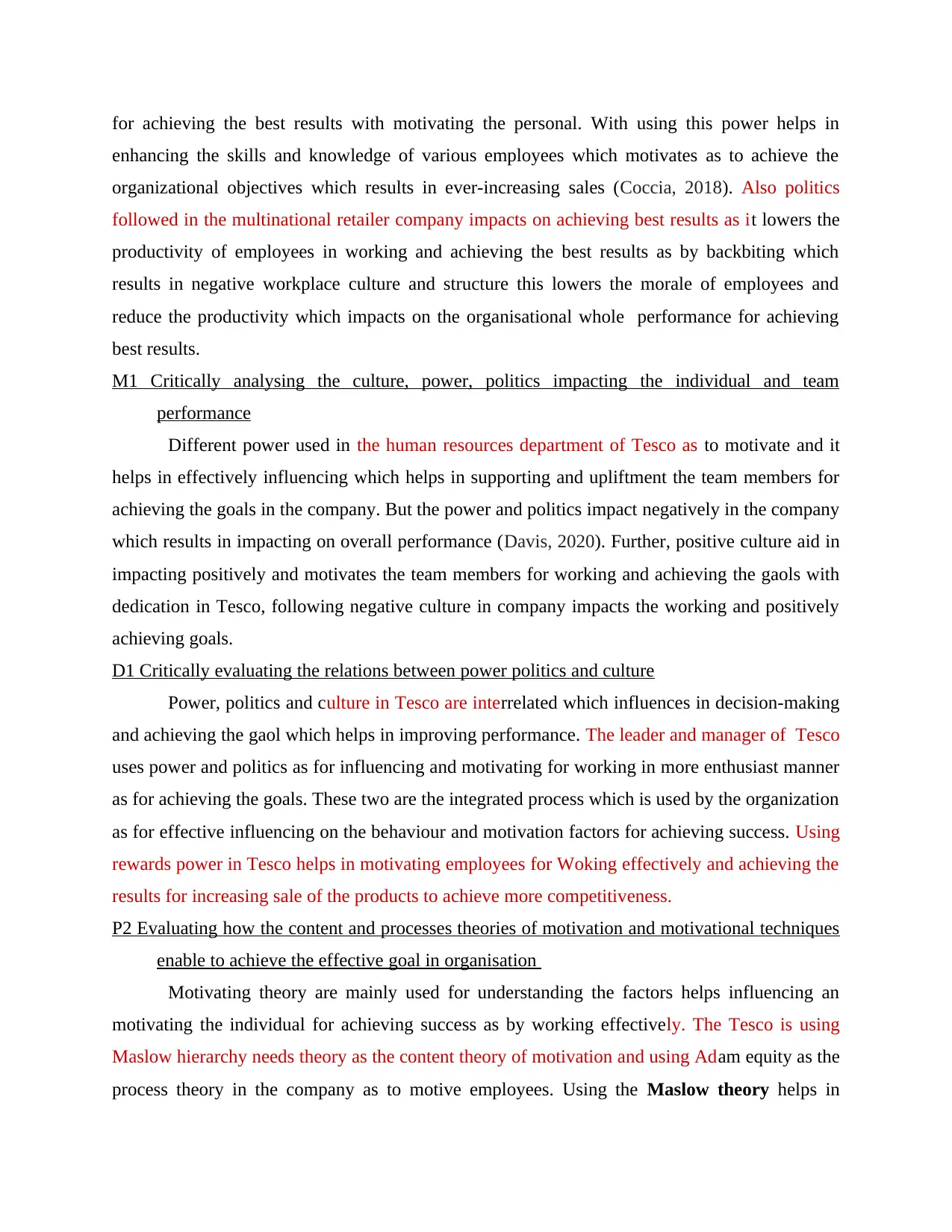
for achieving the best results with motivating the personal. With using this power helps in
enhancing the skills and knowledge of various employees which motivates as to achieve the
organizational objectives which results in ever-increasing sales (Coccia, 2018). Also politics
followed in the multinational retailer company impacts on achieving best results as it lowers the
productivity of employees in working and achieving the best results as by backbiting which
results in negative workplace culture and structure this lowers the morale of employees and
reduce the productivity which impacts on the organisational whole performance for achieving
best results.
M1 Critically analysing the culture, power, politics impacting the individual and team
performance
Different power used in the human resources department of Tesco as to motivate and it
helps in effectively influencing which helps in supporting and upliftment the team members for
achieving the goals in the company. But the power and politics impact negatively in the company
which results in impacting on overall performance (Davis, 2020). Further, positive culture aid in
impacting positively and motivates the team members for working and achieving the gaols with
dedication in Tesco, following negative culture in company impacts the working and positively
achieving goals.
D1 Critically evaluating the relations between power politics and culture
Power, politics and culture in Tesco are interrelated which influences in decision-making
and achieving the gaol which helps in improving performance. The leader and manager of Tesco
uses power and politics as for influencing and motivating for working in more enthusiast manner
as for achieving the goals. These two are the integrated process which is used by the organization
as for effective influencing on the behaviour and motivation factors for achieving success. Using
rewards power in Tesco helps in motivating employees for Woking effectively and achieving the
results for increasing sale of the products to achieve more competitiveness.
P2 Evaluating how the content and processes theories of motivation and motivational techniques
enable to achieve the effective goal in organisation
Motivating theory are mainly used for understanding the factors helps influencing an
motivating the individual for achieving success as by working effectively. The Tesco is using
Maslow hierarchy needs theory as the content theory of motivation and using Adam equity as the
process theory in the company as to motive employees. Using the Maslow theory helps in
enhancing the skills and knowledge of various employees which motivates as to achieve the
organizational objectives which results in ever-increasing sales (Coccia, 2018). Also politics
followed in the multinational retailer company impacts on achieving best results as it lowers the
productivity of employees in working and achieving the best results as by backbiting which
results in negative workplace culture and structure this lowers the morale of employees and
reduce the productivity which impacts on the organisational whole performance for achieving
best results.
M1 Critically analysing the culture, power, politics impacting the individual and team
performance
Different power used in the human resources department of Tesco as to motivate and it
helps in effectively influencing which helps in supporting and upliftment the team members for
achieving the goals in the company. But the power and politics impact negatively in the company
which results in impacting on overall performance (Davis, 2020). Further, positive culture aid in
impacting positively and motivates the team members for working and achieving the gaols with
dedication in Tesco, following negative culture in company impacts the working and positively
achieving goals.
D1 Critically evaluating the relations between power politics and culture
Power, politics and culture in Tesco are interrelated which influences in decision-making
and achieving the gaol which helps in improving performance. The leader and manager of Tesco
uses power and politics as for influencing and motivating for working in more enthusiast manner
as for achieving the goals. These two are the integrated process which is used by the organization
as for effective influencing on the behaviour and motivation factors for achieving success. Using
rewards power in Tesco helps in motivating employees for Woking effectively and achieving the
results for increasing sale of the products to achieve more competitiveness.
P2 Evaluating how the content and processes theories of motivation and motivational techniques
enable to achieve the effective goal in organisation
Motivating theory are mainly used for understanding the factors helps influencing an
motivating the individual for achieving success as by working effectively. The Tesco is using
Maslow hierarchy needs theory as the content theory of motivation and using Adam equity as the
process theory in the company as to motive employees. Using the Maslow theory helps in
Paraphrase This Document
Need a fresh take? Get an instant paraphrase of this document with our AI Paraphraser
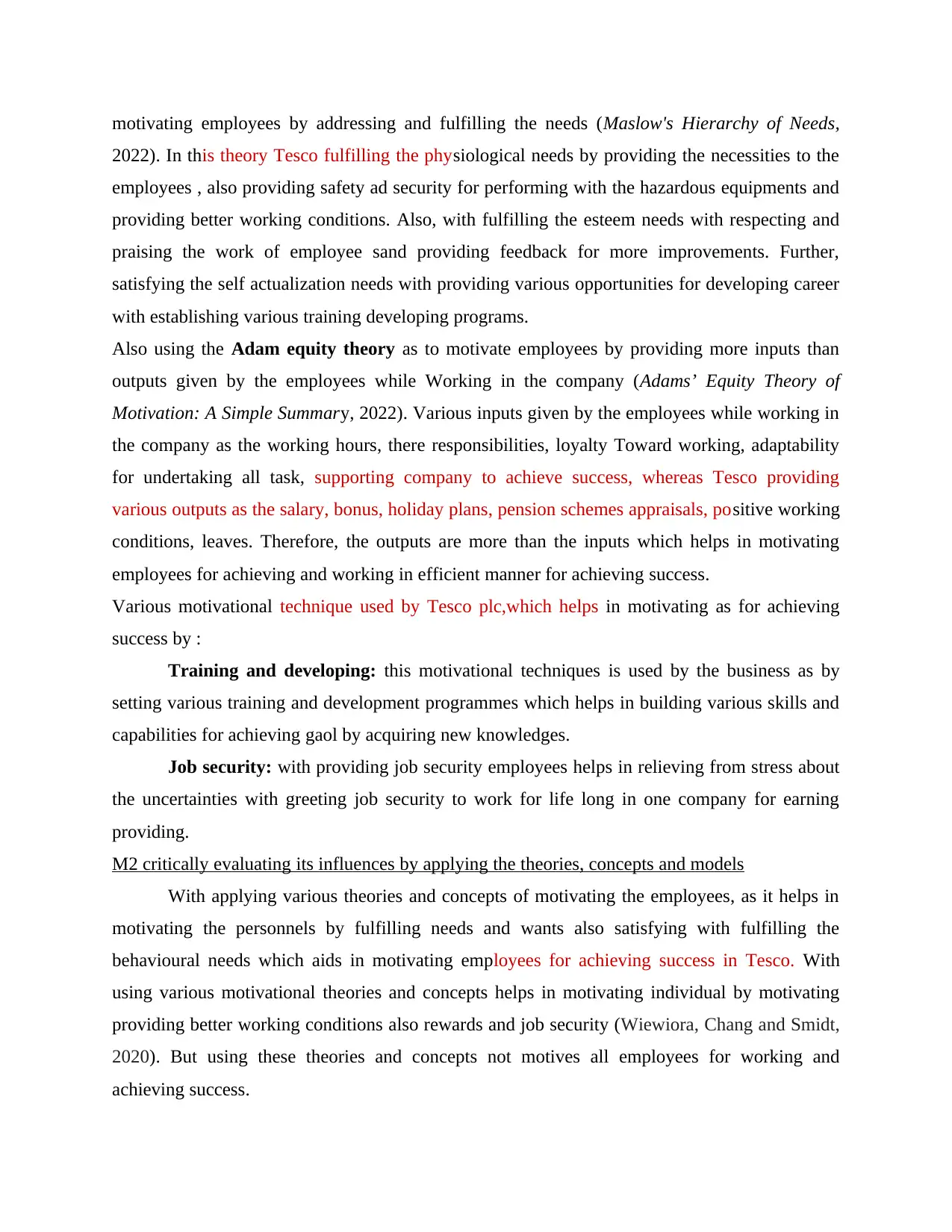
motivating employees by addressing and fulfilling the needs (Maslow's Hierarchy of Needs,
2022). In this theory Tesco fulfilling the physiological needs by providing the necessities to the
employees , also providing safety ad security for performing with the hazardous equipments and
providing better working conditions. Also, with fulfilling the esteem needs with respecting and
praising the work of employee sand providing feedback for more improvements. Further,
satisfying the self actualization needs with providing various opportunities for developing career
with establishing various training developing programs.
Also using the Adam equity theory as to motivate employees by providing more inputs than
outputs given by the employees while Working in the company (Adams’ Equity Theory of
Motivation: A Simple Summary, 2022). Various inputs given by the employees while working in
the company as the working hours, there responsibilities, loyalty Toward working, adaptability
for undertaking all task, supporting company to achieve success, whereas Tesco providing
various outputs as the salary, bonus, holiday plans, pension schemes appraisals, positive working
conditions, leaves. Therefore, the outputs are more than the inputs which helps in motivating
employees for achieving and working in efficient manner for achieving success.
Various motivational technique used by Tesco plc,which helps in motivating as for achieving
success by :
Training and developing: this motivational techniques is used by the business as by
setting various training and development programmes which helps in building various skills and
capabilities for achieving gaol by acquiring new knowledges.
Job security: with providing job security employees helps in relieving from stress about
the uncertainties with greeting job security to work for life long in one company for earning
providing.
M2 critically evaluating its influences by applying the theories, concepts and models
With applying various theories and concepts of motivating the employees, as it helps in
motivating the personnels by fulfilling needs and wants also satisfying with fulfilling the
behavioural needs which aids in motivating employees for achieving success in Tesco. With
using various motivational theories and concepts helps in motivating individual by motivating
providing better working conditions also rewards and job security (Wiewiora, Chang and Smidt,
2020). But using these theories and concepts not motives all employees for working and
achieving success.
2022). In this theory Tesco fulfilling the physiological needs by providing the necessities to the
employees , also providing safety ad security for performing with the hazardous equipments and
providing better working conditions. Also, with fulfilling the esteem needs with respecting and
praising the work of employee sand providing feedback for more improvements. Further,
satisfying the self actualization needs with providing various opportunities for developing career
with establishing various training developing programs.
Also using the Adam equity theory as to motivate employees by providing more inputs than
outputs given by the employees while Working in the company (Adams’ Equity Theory of
Motivation: A Simple Summary, 2022). Various inputs given by the employees while working in
the company as the working hours, there responsibilities, loyalty Toward working, adaptability
for undertaking all task, supporting company to achieve success, whereas Tesco providing
various outputs as the salary, bonus, holiday plans, pension schemes appraisals, positive working
conditions, leaves. Therefore, the outputs are more than the inputs which helps in motivating
employees for achieving and working in efficient manner for achieving success.
Various motivational technique used by Tesco plc,which helps in motivating as for achieving
success by :
Training and developing: this motivational techniques is used by the business as by
setting various training and development programmes which helps in building various skills and
capabilities for achieving gaol by acquiring new knowledges.
Job security: with providing job security employees helps in relieving from stress about
the uncertainties with greeting job security to work for life long in one company for earning
providing.
M2 critically evaluating its influences by applying the theories, concepts and models
With applying various theories and concepts of motivating the employees, as it helps in
motivating the personnels by fulfilling needs and wants also satisfying with fulfilling the
behavioural needs which aids in motivating employees for achieving success in Tesco. With
using various motivational theories and concepts helps in motivating individual by motivating
providing better working conditions also rewards and job security (Wiewiora, Chang and Smidt,
2020). But using these theories and concepts not motives all employees for working and
achieving success.
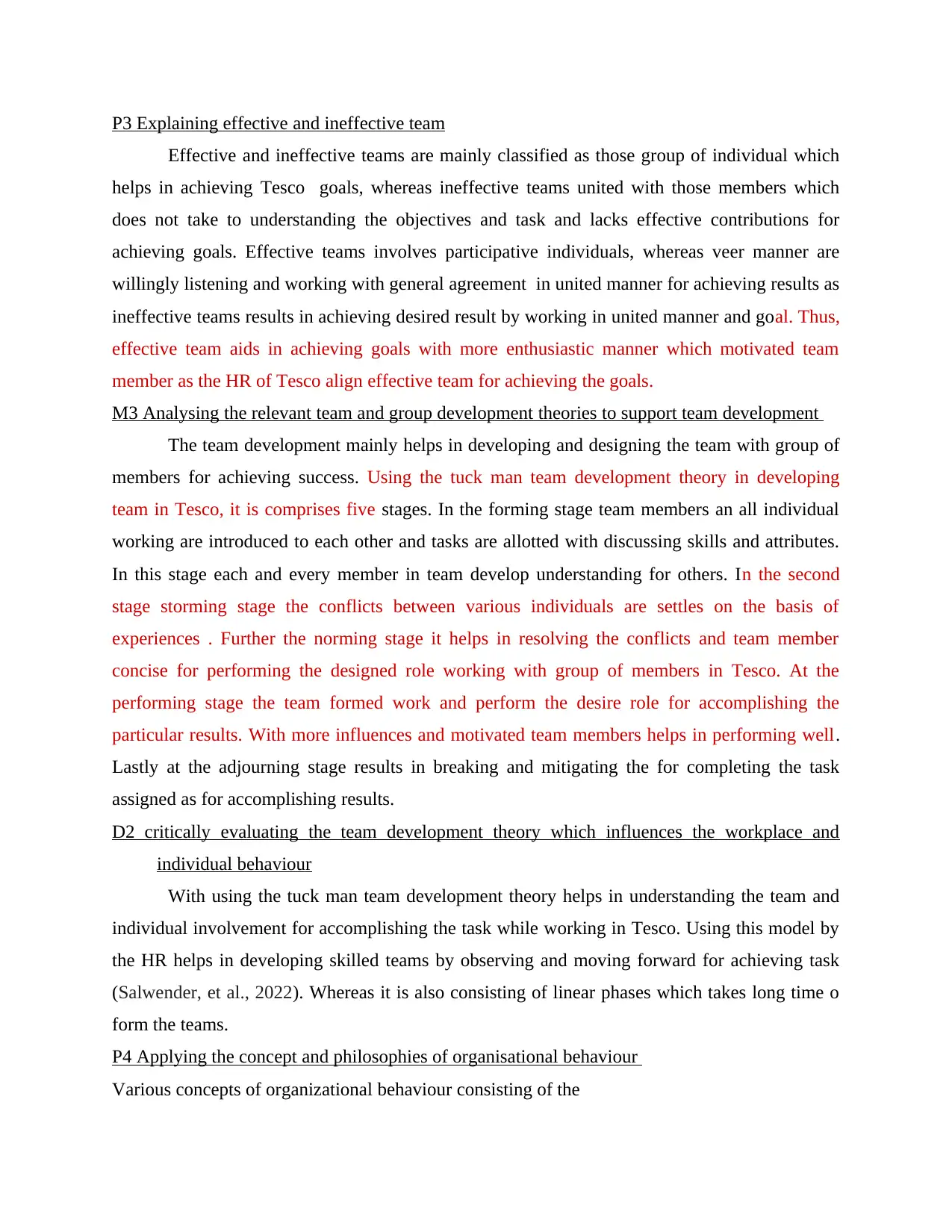
P3 Explaining effective and ineffective team
Effective and ineffective teams are mainly classified as those group of individual which
helps in achieving Tesco goals, whereas ineffective teams united with those members which
does not take to understanding the objectives and task and lacks effective contributions for
achieving goals. Effective teams involves participative individuals, whereas veer manner are
willingly listening and working with general agreement in united manner for achieving results as
ineffective teams results in achieving desired result by working in united manner and goal. Thus,
effective team aids in achieving goals with more enthusiastic manner which motivated team
member as the HR of Tesco align effective team for achieving the goals.
M3 Analysing the relevant team and group development theories to support team development
The team development mainly helps in developing and designing the team with group of
members for achieving success. Using the tuck man team development theory in developing
team in Tesco, it is comprises five stages. In the forming stage team members an all individual
working are introduced to each other and tasks are allotted with discussing skills and attributes.
In this stage each and every member in team develop understanding for others. In the second
stage storming stage the conflicts between various individuals are settles on the basis of
experiences . Further the norming stage it helps in resolving the conflicts and team member
concise for performing the designed role working with group of members in Tesco. At the
performing stage the team formed work and perform the desire role for accomplishing the
particular results. With more influences and motivated team members helps in performing well.
Lastly at the adjourning stage results in breaking and mitigating the for completing the task
assigned as for accomplishing results.
D2 critically evaluating the team development theory which influences the workplace and
individual behaviour
With using the tuck man team development theory helps in understanding the team and
individual involvement for accomplishing the task while working in Tesco. Using this model by
the HR helps in developing skilled teams by observing and moving forward for achieving task
(Salwender, et al., 2022). Whereas it is also consisting of linear phases which takes long time o
form the teams.
P4 Applying the concept and philosophies of organisational behaviour
Various concepts of organizational behaviour consisting of the
Effective and ineffective teams are mainly classified as those group of individual which
helps in achieving Tesco goals, whereas ineffective teams united with those members which
does not take to understanding the objectives and task and lacks effective contributions for
achieving goals. Effective teams involves participative individuals, whereas veer manner are
willingly listening and working with general agreement in united manner for achieving results as
ineffective teams results in achieving desired result by working in united manner and goal. Thus,
effective team aids in achieving goals with more enthusiastic manner which motivated team
member as the HR of Tesco align effective team for achieving the goals.
M3 Analysing the relevant team and group development theories to support team development
The team development mainly helps in developing and designing the team with group of
members for achieving success. Using the tuck man team development theory in developing
team in Tesco, it is comprises five stages. In the forming stage team members an all individual
working are introduced to each other and tasks are allotted with discussing skills and attributes.
In this stage each and every member in team develop understanding for others. In the second
stage storming stage the conflicts between various individuals are settles on the basis of
experiences . Further the norming stage it helps in resolving the conflicts and team member
concise for performing the designed role working with group of members in Tesco. At the
performing stage the team formed work and perform the desire role for accomplishing the
particular results. With more influences and motivated team members helps in performing well.
Lastly at the adjourning stage results in breaking and mitigating the for completing the task
assigned as for accomplishing results.
D2 critically evaluating the team development theory which influences the workplace and
individual behaviour
With using the tuck man team development theory helps in understanding the team and
individual involvement for accomplishing the task while working in Tesco. Using this model by
the HR helps in developing skilled teams by observing and moving forward for achieving task
(Salwender, et al., 2022). Whereas it is also consisting of linear phases which takes long time o
form the teams.
P4 Applying the concept and philosophies of organisational behaviour
Various concepts of organizational behaviour consisting of the
⊘ This is a preview!⊘
Do you want full access?
Subscribe today to unlock all pages.

Trusted by 1+ million students worldwide
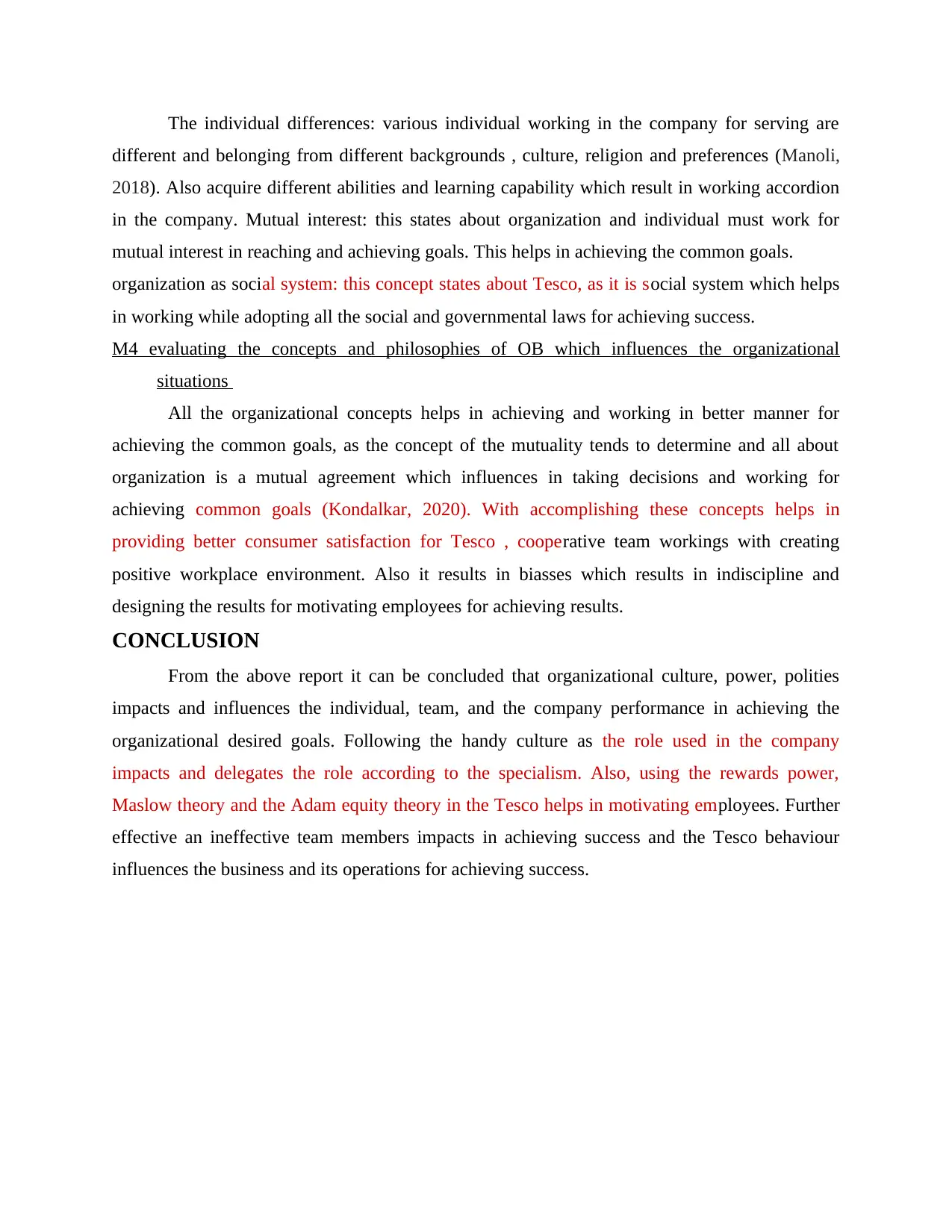
The individual differences: various individual working in the company for serving are
different and belonging from different backgrounds , culture, religion and preferences (Manoli,
2018). Also acquire different abilities and learning capability which result in working accordion
in the company. Mutual interest: this states about organization and individual must work for
mutual interest in reaching and achieving goals. This helps in achieving the common goals.
organization as social system: this concept states about Tesco, as it is social system which helps
in working while adopting all the social and governmental laws for achieving success.
M4 evaluating the concepts and philosophies of OB which influences the organizational
situations
All the organizational concepts helps in achieving and working in better manner for
achieving the common goals, as the concept of the mutuality tends to determine and all about
organization is a mutual agreement which influences in taking decisions and working for
achieving common goals (Kondalkar, 2020). With accomplishing these concepts helps in
providing better consumer satisfaction for Tesco , cooperative team workings with creating
positive workplace environment. Also it results in biasses which results in indiscipline and
designing the results for motivating employees for achieving results.
CONCLUSION
From the above report it can be concluded that organizational culture, power, polities
impacts and influences the individual, team, and the company performance in achieving the
organizational desired goals. Following the handy culture as the role used in the company
impacts and delegates the role according to the specialism. Also, using the rewards power,
Maslow theory and the Adam equity theory in the Tesco helps in motivating employees. Further
effective an ineffective team members impacts in achieving success and the Tesco behaviour
influences the business and its operations for achieving success.
different and belonging from different backgrounds , culture, religion and preferences (Manoli,
2018). Also acquire different abilities and learning capability which result in working accordion
in the company. Mutual interest: this states about organization and individual must work for
mutual interest in reaching and achieving goals. This helps in achieving the common goals.
organization as social system: this concept states about Tesco, as it is social system which helps
in working while adopting all the social and governmental laws for achieving success.
M4 evaluating the concepts and philosophies of OB which influences the organizational
situations
All the organizational concepts helps in achieving and working in better manner for
achieving the common goals, as the concept of the mutuality tends to determine and all about
organization is a mutual agreement which influences in taking decisions and working for
achieving common goals (Kondalkar, 2020). With accomplishing these concepts helps in
providing better consumer satisfaction for Tesco , cooperative team workings with creating
positive workplace environment. Also it results in biasses which results in indiscipline and
designing the results for motivating employees for achieving results.
CONCLUSION
From the above report it can be concluded that organizational culture, power, polities
impacts and influences the individual, team, and the company performance in achieving the
organizational desired goals. Following the handy culture as the role used in the company
impacts and delegates the role according to the specialism. Also, using the rewards power,
Maslow theory and the Adam equity theory in the Tesco helps in motivating employees. Further
effective an ineffective team members impacts in achieving success and the Tesco behaviour
influences the business and its operations for achieving success.
Paraphrase This Document
Need a fresh take? Get an instant paraphrase of this document with our AI Paraphraser
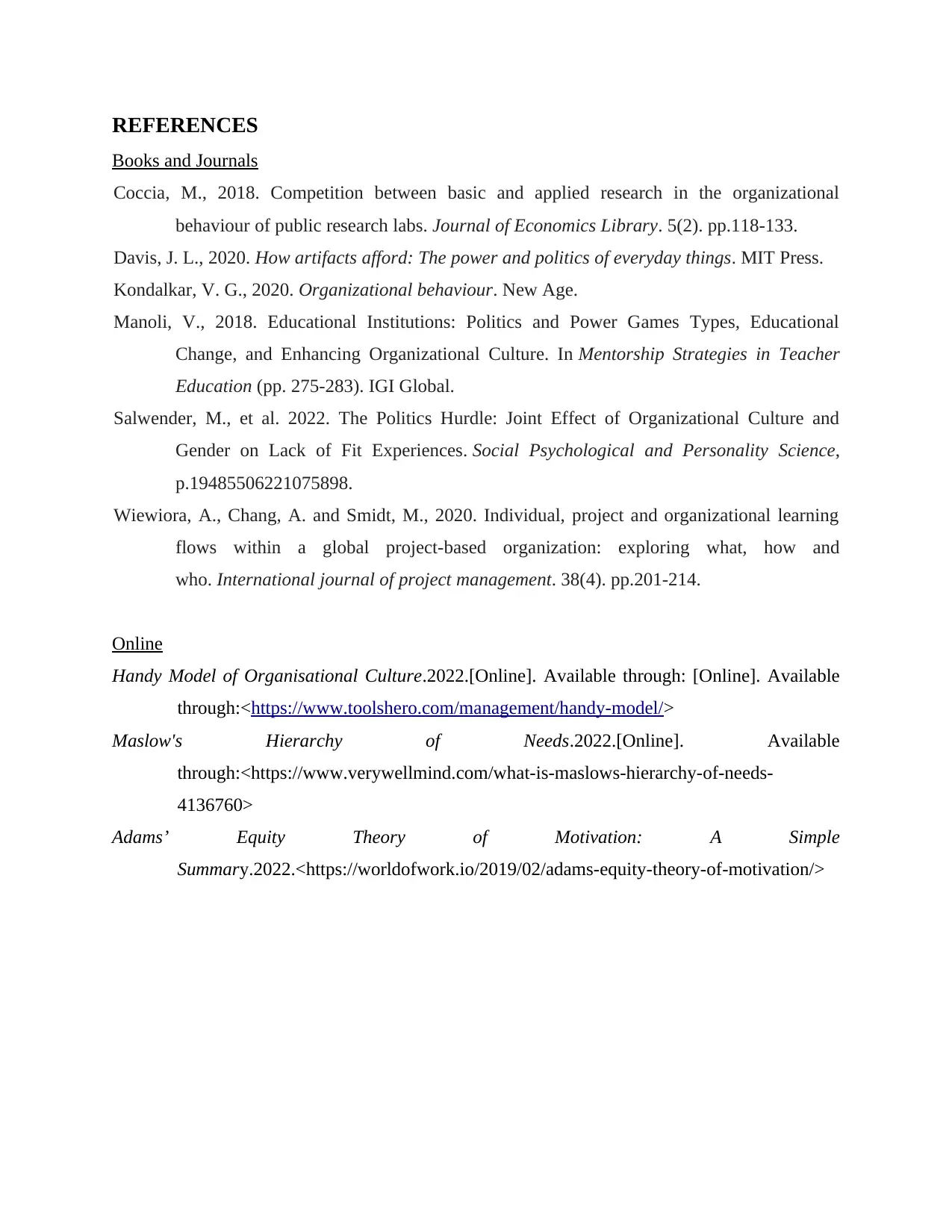
REFERENCES
Books and Journals
Coccia, M., 2018. Competition between basic and applied research in the organizational
behaviour of public research labs. Journal of Economics Library. 5(2). pp.118-133.
Davis, J. L., 2020. How artifacts afford: The power and politics of everyday things. MIT Press.
Kondalkar, V. G., 2020. Organizational behaviour. New Age.
Manoli, V., 2018. Educational Institutions: Politics and Power Games Types, Educational
Change, and Enhancing Organizational Culture. In Mentorship Strategies in Teacher
Education (pp. 275-283). IGI Global.
Salwender, M., et al. 2022. The Politics Hurdle: Joint Effect of Organizational Culture and
Gender on Lack of Fit Experiences. Social Psychological and Personality Science,
p.19485506221075898.
Wiewiora, A., Chang, A. and Smidt, M., 2020. Individual, project and organizational learning
flows within a global project-based organization: exploring what, how and
who. International journal of project management. 38(4). pp.201-214.
Online
Handy Model of Organisational Culture.2022.[Online]. Available through: [Online]. Available
through:<https://www.toolshero.com/management/handy-model/>
Maslow's Hierarchy of Needs.2022.[Online]. Available
through:<https://www.verywellmind.com/what-is-maslows-hierarchy-of-needs-
4136760>
Adams’ Equity Theory of Motivation: A Simple
Summary.2022.<https://worldofwork.io/2019/02/adams-equity-theory-of-motivation/>
Books and Journals
Coccia, M., 2018. Competition between basic and applied research in the organizational
behaviour of public research labs. Journal of Economics Library. 5(2). pp.118-133.
Davis, J. L., 2020. How artifacts afford: The power and politics of everyday things. MIT Press.
Kondalkar, V. G., 2020. Organizational behaviour. New Age.
Manoli, V., 2018. Educational Institutions: Politics and Power Games Types, Educational
Change, and Enhancing Organizational Culture. In Mentorship Strategies in Teacher
Education (pp. 275-283). IGI Global.
Salwender, M., et al. 2022. The Politics Hurdle: Joint Effect of Organizational Culture and
Gender on Lack of Fit Experiences. Social Psychological and Personality Science,
p.19485506221075898.
Wiewiora, A., Chang, A. and Smidt, M., 2020. Individual, project and organizational learning
flows within a global project-based organization: exploring what, how and
who. International journal of project management. 38(4). pp.201-214.
Online
Handy Model of Organisational Culture.2022.[Online]. Available through: [Online]. Available
through:<https://www.toolshero.com/management/handy-model/>
Maslow's Hierarchy of Needs.2022.[Online]. Available
through:<https://www.verywellmind.com/what-is-maslows-hierarchy-of-needs-
4136760>
Adams’ Equity Theory of Motivation: A Simple
Summary.2022.<https://worldofwork.io/2019/02/adams-equity-theory-of-motivation/>
1 out of 8
Related Documents
Your All-in-One AI-Powered Toolkit for Academic Success.
+13062052269
info@desklib.com
Available 24*7 on WhatsApp / Email
![[object Object]](/_next/static/media/star-bottom.7253800d.svg)
Unlock your academic potential
Copyright © 2020–2026 A2Z Services. All Rights Reserved. Developed and managed by ZUCOL.

